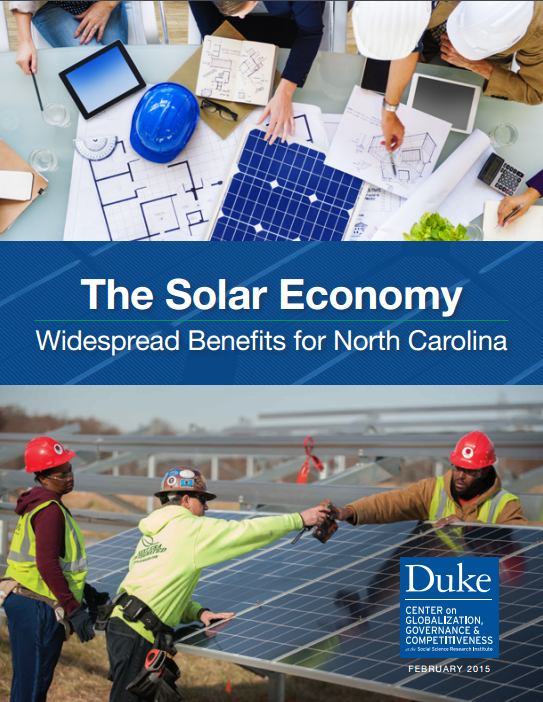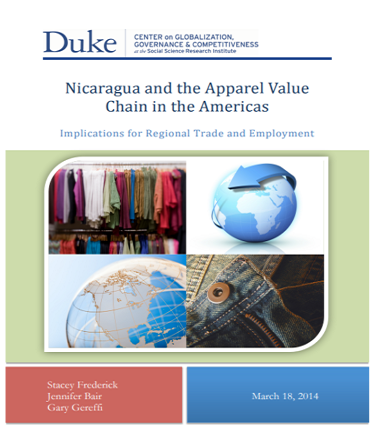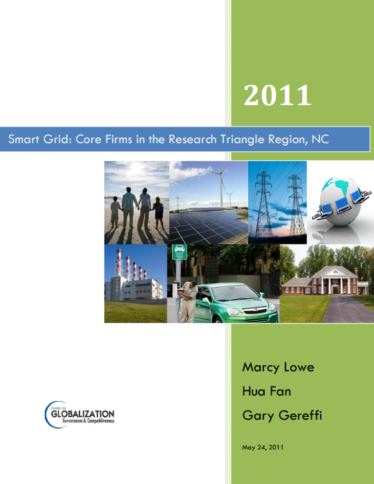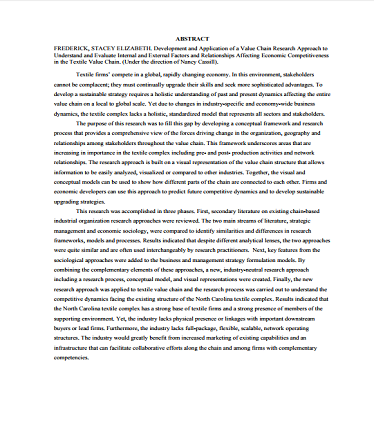The Duke GVC Center’s work on North Carolina covered multiple topics from a variety of angles including contract research reports and teaching/advising through the NC in the Global Economy website and Bass Connections course.
The North Carolina in the Global Economy (NCGE) project covers a unique mix of industries – from textiles, furniture, and hog farming, to information technology and biotechnology – that each play a prominent role in North Carolina’s economy. The NCGE project sheds light on how global economic forces affect local development and employment in key traditional and growing industries in North Carolina, and where the state fits into the rapidly changing economies of the United States and the rest of the world. The NCGE website (www.ncglobaleconomy.com) provides a value chain analysis of seven industries to understand key issues and trends, including industrial structure and its relation to the activities of industry and public actors, the impacts of globalization at the community level, and strategies to promote the positive effects of participation in global industries. Using a unique website format with innovative visualization tools, we show how North Carolina compares with other U.S. states and the rest of the world in terms of innovation, jobs, trade, and investment for seven of the state’s major industries.
Bass Connections is a Duke university-wide, interdisciplinary initiative focused on engaging students in the exploration of unanswered questions about major societal challenges. The Duke GVC Center participated in the Bass Connections program for three years by leading a course under the education and human development theme entitled “North Carolina in the Global Economy: the Workforce Development Challenge.” The course was co-led by Dr. Gary Gereffi and Lukas Brun with research and technical support from Stacey Frederick. The course was open to undergraduate students from all disciplines and years, although the majority were juniors in Public Policy or Economics majors pursuing the Markets and Management certificate. Each of the three years had a different focus area related to workforce development and competitiveness in North Carolina:
– 2013-2014: in the first year, students looked at the seven industries on the NC in the Global Economy website and assisted the Duke GVC Center in updating the content of the website.
– 2014-2015: in year two, students researched North Carolina’s position in the defense and aerospace sectors.
– 2015-2016: In the final year, students looked at North Carolina’s Appalachian Regional Commission’s counties in the automotive and beverage value chains.
The course objectives were to update and extend our knowledge of economic and workforce development challenges in North Carolina’s main and emerging industries. The course was a highly innovative, fast-paced interdisciplinary research collaboration between students, faculty and staff focused on developing practical research and team project skills, creating networking opportunities with professionals (guest lectures and networking), identifying summer research work opportunities, and creating outputs that matter to policymakers. Each year, two teams of 3-5 students created project plans and team charters, developed value chain maps of their industries, invited guest speakers from industry, government, community colleges and non-profits, and developed websites, reports, and academic articles summarizing their findings.
News Articles
– Duke Today article: May 5, 2014: The State’s Changing Economy: Bass Connections students’ research used by NC officials to better understand economy.
– Duke Office of Federal Relations: September 12, 2014: DC Briefing: North Carolina in the Global Economy. Staff from NC Congressional offices, representatives from Governor Pat McCrory’s Washington office, and individuals representing North Carolina-focused businesses gathered in a Capitol Hill meeting room on Friday morning to learn more about the NCGE project.





